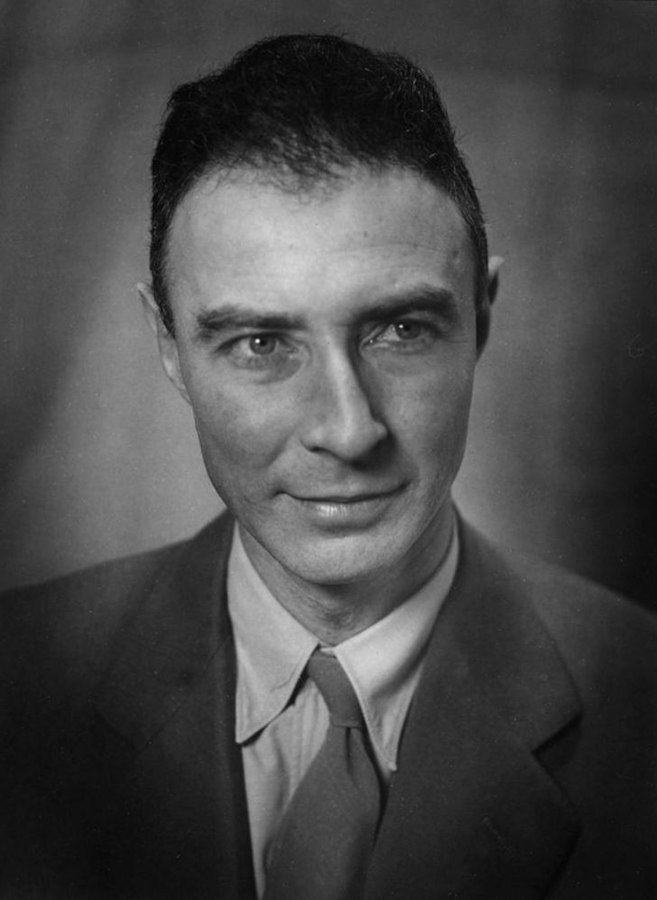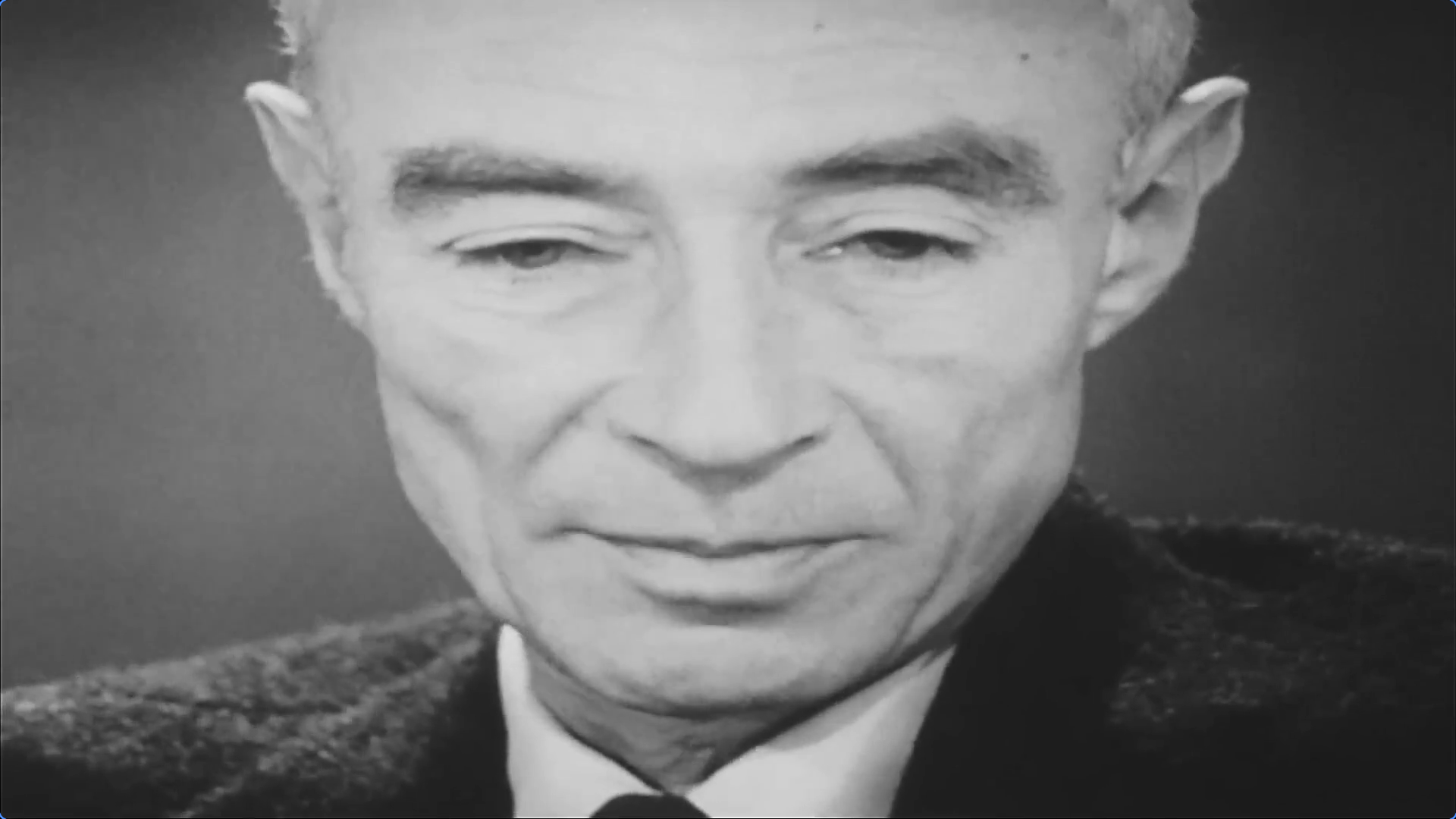Who is J. Robert Oppenheimer? 10 interesting facts about the 'father of atomic bomb'
At A Glance
- "Oppenheimer" by Christopher Nolan recently became the top-grossing World War II film with $552 million. The biopic thriller, which stars Cillian Murphy as the lead role, shows the legacy and life of J. Robert Oppenheimer, the creator of the atomic bomb.

A portrait of J. Robert Oppenheimer (Los Alamos National Laboratory)
You’ve probably seen “Barbenheimer” memes and jokes that were all over social media before the same-day premiere of significantly different movies “Barbie” and “Oppenheimer.” They were referenced 15 years ago when “Mamma Mia!” and “The Dark Knight” also hit theaters on the same day. As history repeats itself, the public highly anticipated both films.
“Oppenheimer” by Christopher Nolan recently became the top-grossing World War II film with $552 million. The biopic thriller, which stars Cillian Murphy as the lead role, shows the legacy and life of J. Robert Oppenheimer, the creator of the atomic bomb.
Oppenheimer—the real guy—led the top-secret Manhattan Project at Los Alamos, a secret project aimed at inventing the first-ever nuclear weapons. The two atomic bombs that laid waste on the Japanese cities of Hiroshima and Nagasaki in August 1945 were actually based on the technology he developed.

Oppenheimer in the NBC News documentary 'OPPENHEIMER: The Decision to Drop the Bomb' (1965)
Here are some fascinating facts about the center of the movie, the man behind the world’s first nuke:
* He was a child prodigy
As a child, Oppenheimer was already a prodigy with a strong inclination for sciences. He was also knowledgeable about philosophy and languages such as Latin and Greek. Born in New York City on April 22, 1902, he liked to collect rocks and minerals and write poetry.
At the age of 12, he was invited to present a lecture about Geology at the New York Mineralogical Club. Biographers Kai Bird and Martin J. Sherwin, in their book “American Prometheus: The Triumph and Tragedy of J. Robert Oppenheimer” wrote that “By the age of 12, he was using the family typewriter to correspond with a number of well-known geologists about the rock formations he had studied in Central Park.”
* He was a polyglot
The historical figure had a facility for languages, as he was known to speak six, namely Greek, Latin, French, German, Dutch, and Sanskrit. He had an incredible capacity for absorbing information and an appetite for knowledge and intellect.
He sought private lessons from his professor at the University of California to learn Sanskrit, an ancient language in India.
* He thought of the Bhagavad Gita on the day of the Trinity Nuclear Test
Oppenheimer witnessed the Trinity Nuclear Test, where the first nuclear bomb detonated in the New Mexico desert early morning on July 16, 1945. In an interview later in 1965, he recounted that a line from the Bhagavad Gita (700-verse Hindu scripture) came to mind when the explosion was so intense that it appeared to be a second sun.
It was an eerie statement showing how powerful his team’s invention was. He said: “We knew the world would not be the same. A few people laughed, a few people cried. Most people were silent. I remembered the line from the Hindu scripture, the Bhagavad Gita; Vishnu is trying to persuade the Prince that he should do his duty and, to impress him, takes on his multi-armed form and says, ‘Now I am become Death, the destroyer of worlds.’ I suppose we all felt that, one way or another.”
* He was the first person who claimed the existence of black holes
Before becoming the Manhattan Project leader, Oppenheimer was one of the physicists studying astrophysics and the formation of “dark stars,” now known as black holes.
He was the first to propose the existence of black holes in his paper published in 1939 entitled “On Continued Gravitational Contraction,” along with Hartland Snyder, his colleague from the University of California Berkeley. The paper proposed the first collapse model describing how a star turns into a black hole.
* He was nominated thrice for Nobel Prize but never won
Despite being nominated three times, the eccentric physicist never won a Nobel Prize in physics. According to a 1949 article in Life, Oppenheimer declared that building an atomic bomb was more inventive than scientific. He thought that the scientific research of various scientists he put together led to the creation of the nuclear bomb.
Nonetheless, he did receive the renowned Enrico Fermi Award in 1963 for his “especially meritorious contribution to the development, use, or control of atomic energy.”
* He never expressed regret for creating the atomic bomb
The scientist defended the Manhattan Project, saying that it was a necessary invention to explore further the possibilities of nuclear science. On the night of the Hiroshima bombing, he also declared that his only regret was that they “hadn’t developed the bomb in time to use it against the Germans” earlier.
However, his feeling of achievement vanished after the bombing in Nagasaki, which he believed was unnecessary and uncalled for. He then wrote to the war secretary with a warning that “the safety of this nation…cannot lie wholly or even primarily in its scientific or technical prowess. It can be based only on making future wars impossible.”
Two months later, he met with Harry S. Truman in October. During this meeting, he expressed repulsion and claimed to have “blood on his hands.” The president became enraged by the remark, ended the session, and later described Oppenheimer as a “crybaby scientist.”
* He opposed the hydrogen bomb
Since then, Oppenheimer has discouraged the expansion of nuclear weapons and advocated pursuing nuclear technology in other things, such as power generation. He vocally opposed the development of the hydrogen bomb, which earned him political enemies.
His downfall started from here on. He became aware of the war and suffering his invention would create. Despite spending his entire life fighting for the ban on nuclear bombs, he never said he regretted making the bomb.
Historian Alex Wellerstein described Oppenheimer as a “tricky figure,” and said that “he doesn’t slot into easy categories of pro-nuclear, anti-nuclear or anything like that.”
* His security clearance was revoked
During the era of the Red Scare—the height of anti-communism in America—he was accused of associating with the Communist Party. The hearings also cited his opposition to the creation of the hydrogen bomb.
His security clearance was revoked because he was considered a “security risk.”
In 2022, more than 50 years after his death, his security clearance was finally restored when the case was reopened and they discovered that the investigations were unjust.
* He argued with Albert Einstein
Just before he went to the hearing that got his security clearance withdrawn, he and Einstein had a conversation. They were in the same workplace after the war and became close colleagues.
According to Kai Bird, co-writer of American Prometheus, Einstein told Oppenheimer that he “had no obligation to subject himself to the witch hunt, that he had served his country well, and that if this was the reward she [America] offered he should turn his back on her.”
However, Oppenheimer responded that the other scientist “doesn’t understand.” As Einstein returned to his office, he said, “There goes a narr [fool].”
* He died of cancer
Oppenheimer founded the World Academy of Arts and Sciences and lectured on science and ethics until he died in 1967, never returning to government service. The scientist was called a “tall, thin chain smoker” with self-destructive tendencies. (Jaff Emielene Conejos/OJT/University of Santo Tomas)